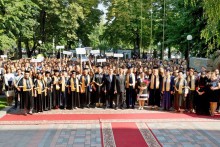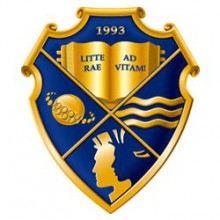Alfred Nobel University has entered its special, 25th year of existence. From the perspective of schools with age-old (or even millennial) history, this is a negligible age. But it is no news that in the 20th and especially in the 21st century time shrinks because it is saturated with innovative events. Therefore those who consistently support innovation can in no time walk the path that took others centuries. This also applies to Alfred Nobel University, which just two decades ago was only one in a multitude of non-public schools trying to find its own niche in the 1990s education space. But today, according to British experts, the university has become “the flagship of higher education in Ukraine” and has been holding a top position for three years as to the number of enrolments. In 2017, despite the nationwide trend towards decrease in enrolment, Nobel University’s campus in Dnipro has added almost 1,800 new students, of whom 1,300 are freshmen in baccalaureates and enrolments in master’s programs.
Now Alfred Nobel University is a contemporary, European-style university catering for some 4,000 students from Ukraine and almost 200 international students from over 50 other countries. The university’s curricula have not only national, but also international accreditation, from the Central Evaluation and Accreditation Agency (ZEvA, Germany) and the European Council for Business Education (ECBE, Belgium), which has been confirmed multiple times since 2012. In 2011 Nobel University’s system of education and research quality management was first certified by international organizations as meeting ISO 9001:2015 standards.
A logical question suggests itself: what is the secret of this success? Virtually each staff member could answer with one word: innovation. It is innovation that defines the Strategy of Alfred Nobel University, passed by its academic council last year. According to this strategy, focus on the student is the cornerstone for university life. Everything there is subordinated to one goal: to create conditions for receiving contemporary European-class education in a comfortable environment, starting with the syllabus to student – faculty relations to technical equipment of classes and the comfort standards of dormitories. Here is only one example. Faced with soaring heating prices a couple of years ago, the university decided to build its own boiler plant using Ukraine-made wood pellets and absolutely independent of gas prices. As a result, heating costs dropped threefold, while capital investment paid back in two years. Moreover, the university has a comfortable temperature throughout the entire year and does not need an extra winter recess which breaks up the school year at other universities.
Nobel University has even earned a nickname in Dnipro: “the warm university.” Yet for the students and faculty this notion comprises much more than just a comfort temperature. It also includes the warmth with which the university embraces its students. A manifestation of such warm care could be seen in the tutorial system, introduced to follow the example of the British partners. All freshmen have a personal tutor, a mentor from the profile department staff, who helps the newbie to fast and painlessly adapt to his or her new student life and, according to the tutorship clause in the university charter, to “build a personal study trajectory.”
Today each respectable European university has not only programs in the national language, but also academic programs in English. Back in 2010 the first English language training program for bachelors in international economic studies was launched at Alfred Nobel. Next year this program was validated at the University of Wales in the UK. The validation agreement envisaged teaching in English exclusively by the Alfred Nobel faculty, while the partner university should render consulting services and closely monitor the performance. After several visits of its representatives to Ukraine the British university was assured that students at Nobel University were taught according to British quality standards and agreed to award the graduates of this program its degrees in international management. As a result, the program has become attractive not only for Ukrainian students, but also for international applicants, who need not spend an extra year at a preparatory department and can receive a British diploma at Ukrainian prices. As of today, 50 graduates of this program have such diplomas.
Starting with 2001, Poland has become a major direction in the university’s international activity. Alfred Nobel University has nearly a dozen cooperation deals with Polish partners, and these deals do work. Annually, 10 to 15 university graduates receive Polish bachelor degrees in English language and literature in addition to their Ukrainian diplomas. In 2017, 15 graduates of MBA at the university’s International Business School also received diplomas of the Wyzsza Szkola Biznesu – National-Louis University, Poland. Law and psychology students are already also earning double degrees. According to Borys Kholod, president of the university, the problem of brain drain to Europe should not be solved by bans. Conversely, universities must offer such educational projects in this country which would be attractive for Ukrainian young men and women.
Over the years of its existence Alfred Nobel University has trained almost 37,000 bachelors, specialists, and masters who are enjoying successful careers in Ukraine and worldwide. According to the Dnipropetrovsk Oblast Employment Center, a maximum of 0.5 percent of Nobel University graduates have applied for help, which is negligible compared to other schools. The university has created an efficient practical slant in its teaching process, which is conductive to the graduates’ high competitiveness. The Professional Development and Career Center is busy helping students and graduates to find jobs.
Biennial International Nobel Congresses have since 2008 become a major highlight in the university’s academic life. Among the participants are renowned scholars, political and public figures from across the globe, including Nobel Prize winners Joseph Stiglitz (US) and Mario Vargas Llosa (Peru – Spain), the head of the Nobel family Dr. Michael Nobel (Sweden), former deputy prime minister of Poland Dr. Grzegorz Kolodko, ambassadors of Norway and Spain to Ukraine, to name a few.
Yet the enumeration of achievements alone might create an impression that the university has no problems at all. “This is not the case,” objects Kholod. “Unfortunately, we live in a society in which abiding by the law has not yet become a norm. Yes, the Law of Ukraine ‘On Higher Education’ grants equal status to all universities regardless of ownership. However, this equality exists only on paper. Over the recent three years non-public schools have never been able to tender for public-funded seats. Nothing has been done to implement the principle ‘money follows the student.’ Quite often we face dishonest competition and bold-faced dumping practices. However, at 25 we are not only renowned. We are also young and dynamic. And we look towards future with confidence.”
Olena KOSHMAN, Business Finance Manager Eastern Europe and Turkey at DuPont, expert for ZEvA:
“I have always found education and learning important, I learn non-stop as well. That is why, when the Hannover-based Evaluation and Accreditation Center ZEvA offered me a position of business expert in the certification of a number of programs and their compliance with European higher education standards, I agreed immediately. Alfred Nobel University was the first in Ukraine to agree to accomplish this process, which started two years ago. It was a bold decision. I would like to mention the university’s Career Center which is doing a great job finding job placements and traineeships for students. When I worked for my Ukrainian degree, career was your own headache. This prompted me to hold career consultations for students. I love seeing faces lit up with interest. This new experience is very valuable for the university.”
Nastia KOLOMIIETS, graduate, Alfred Nobel University (2012) and the Higher School of Finance (Prague, the Czech Republic), currently working at ACS, A Xerox Company:
“I can definitely say that the knowledge I gained at my first university has laid the foundations for my career, it has always helped me. Having completed a master program in Prague, I can compare things and I am convinced that Alfred Nobel University is not worse, and in some aspect is even better than European schools.”
Maryna PAVLYCHENKO, graduate, English Philology and Translation Department, Alfred Nobel University:
“Those professional skills and knowledge which I gained at the university, thanks to highly qualified, caring, and enthusiastic faculty, helped me find a decent job, try myself in a new field, and start my own business. Now I am founder and director of Eruditus, an education company. Our sphere of interest is education abroad, and we have already opened two offices, in Kharkiv and Dnipro. At present, our company counts more than 200 partner schools across the world.”
Vladyslav KOVALENKO, father of a student at Alfred Nobel University:
“What I want for my daughter? I want her to find her place in life. She has followed her heart to make a choice. She believes in herself and so she enrolled at the university. Now she is doing English and training to become a translator, and I believe everything will be great.”
Anastasia KOVALENKO, student of an English-language program in international economic relations:
“I heard that Alfred Nobel University offers a program where all disciplines are taught in English. This is a great opportunity not only to gain specialist knowledge, but master the knacks of communicating in English, which is so important in today’s globalized world. What also attracts me is that I have an opportunity to meet people from various other countries and build up a network of contacts which I might need for my future career.”








